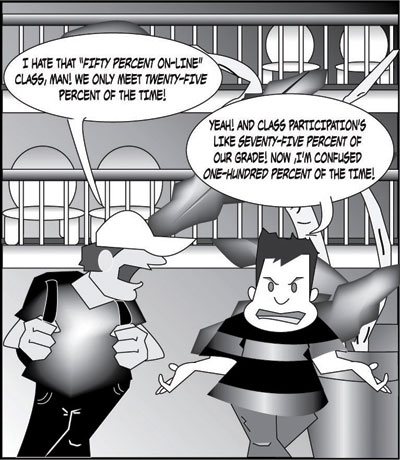EDITORIAL: Making the transition to online classes
Balancing responsibilities proves crucial to students’ and teachers’ success

Education has gone digital. As of fall 2011, UHCL offers seven graduate programs, five under-graduate degrees and eight certificate courses fully online.
With online classes becoming a significant part of mainstream college education, it is now important that both students and faculty are trained to make the most of these classes.
The 2010 Sloan Survey of Online Learning reports approx-imately 5.6 million students in more than 2,500 colleges and universities took classes online, a figure that rose by one million from 2009. The same study points to almost 30 percent of the total college and university student population taking at least one course online.
It is obvious that there is a high demand for online courses, but low grades and poor completion rates compel us to take a closer look at this defeating trend. Students and faculty need to find an effective learning middle ground on the online turf.
The demand for online programs comes from the flexibility and convenience these classes offer. UHCL is a campus with a diverse 8,000- strong student body, and online course offerings are a great advantage to many students.
Students have to be proactive in staying on task and keeping up with the pace of a course in the absence of a regular class time. For all procrastinators out there, that means a semester’s worth of work cannot be done in one weekend. Self-motivation is a prime pre-requisite for online classes, a fact many students ignore.
Online classes become a struggle for those students who think these courses are an easy option. The very reasons students seek out online courses become the same reasons for their falling behind. Without the discipline of face-to-face interaction, work and family demands easily push schoolwork to the back burner.
The lack of preparedness for the online format is a primary reason why the dropout rate for online classes is higher than face-to-face classes. This is a key area where the students can be tutored on how to ready themselves for their self-paced learning, in step with the teacher’s expectations.
The UHCL Distance Education webpage has a guide that helps students check how ready they are for online coursework.
With online education programs aiming to reach a bigger, non-traditional student audience, online orientation must be emphasized. Technological support must help students use all the online course tools to maximize learning, and students need guidance to resolve the technical snags they face.
The Office of Online Programs provides access to many troubleshooting resources and includes a comprehensive orientation guide. Also, the Student Success Center offers tutoring sessions in Blackboard.
While students need to stay organized and accept responsibility, the faculty also must undergo training with instructional designers to present their class effectively on an online platform. Dumping scrolls of lecture notes, posting links for textbooks, or creating assignments and quizzes without clear instruction is the result of lazy teaching, a process that frustrates students and turns faculty into mere graders.
They need to establish good rapport with the students, ensure that students understand the content and collaborate well with fellow students, all without the advantage of direct interaction.
Both students and instructors need to stay actively involved in the online learning process. The typical response time students should expect from faculty is 48 hours on weekdays, but it is not uncommon for faculty to feel they are always “on call when teaching an online class.”
Faculty and students need to be alert, respectful and realistic while interacting on discussion boards, chat-rooms and e-mail.
In the current transition from WebCT to the Blackboard 9.1 system, a total of 526 out of 636 teachers, accounting for 83 percent of the faculty body, have been trained to use Blackboard.
Further, the university offers voluntary faculty workshops in the Digital Academy for Online Learning. It is time that students access their training resources as well, to makes online classes a viable educational reality.

